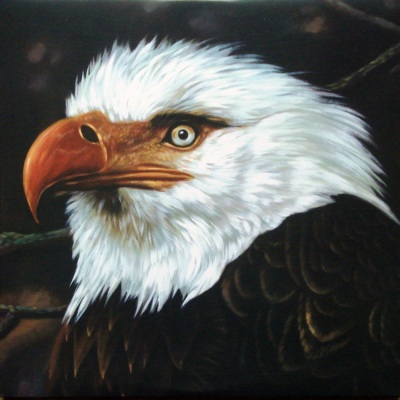
The Hawk Is Howling
In 2003, Mogwai released their fourth full length, Happy Songs for Happy People, and its reception ranged from middling to favorable. Some praised the band's scope, grandeur, and willingness to explore beyond the bounds of the quiet-loud-louder dynamic it had mastered; others lamented a lack of the same, alternately calling Happy Songs too soft, too small, or too stiff. Happy Songs now feels like a summation of Mogwai's past, graced with good ideas for its future. Unfortunately, the music that led to that nexus has been much more compelling than what has emerged from it. Mogwai's new album, The Hawk Is Howling, is the next iteration of the sound that began with Happy Songs. You get a handful of abbreviated heavy tracks, an equitable batch of somnolent drifts, and the occasional suggestive-of-the-future curveball. Just like 2006's Mr. Beast, Hawk follows an unevenly stacked 10-song structure, opening with a stately piano build ("Auto Rock" versus "I'm Jim Morrison, I'm Dead"), a ferocious follow ("Glasgow Mega-Snake" versus "Batcat"), and a drifting reverie ("Acid Food" versus "Danphe and the Brain") before allowing the middle sag into vacuity. The last three tracks of both records form suites of sorts: Track eight offers a hint of menace, which is reined in on a gentle follow-up before the closer amplifies it all. It's a sensible strategy, and The Hawk Is Howling is ultimately listenable, understandable, and vaguely likable. Like the songs that shape it, though, the album just feels redundant and tenuous, like the last empty cloud trailing behind a fierce storm. Part of the problem, it seems, is that at its frequent best Mogwai's music is more than the sum of its instrumental parts. While the band's musicianship feels competent enough, the components themselves are rarely intricate or involved. Instead, the feeling pushed the songs through-- an unspoken understanding, it seems, that the band is arriving at some indefinable place, and we're just lucky enough to listen in. Neither the eerie majesty of "2 Rights Make 1 Wrong" nor the exhausting force of "Like Herod" are difficult to understand musically, but-- atmospherically-- they're brilliant, elusive, and mysterious. This partly explains why so many bands have pilfered Mogwai's trademark intervals and itinerant epic structures, even if they've gotten it wrong: Mogwai sound grand, but the stuff's not too hard to play. I mean, how many imitation Orthrelm's do you know? But over the band's six full-lengths, there's been a steady increase in production value, in making the parts sound better or more perfectly tough and mean. So, while "Batcat" boasts viscous guitars and, in general, good mixing, its "savage" parts sound too self-conscious, almost as though the song's been flooded with alternate guitar takes that are mostly just pedals being twisted and turned to maximize cacophony. Unlike "Mogwai Fear Satan", for instance, it seems less the product of letting go and more the waste of deliberately meeting old expectations. The appropriately named "The Precipice" is a seven-minute ascent through a simple guitar pattern, vaguely resembling Rhys Chatham's Guitar Trio. It sounds great, but it also sounds exactly like what you'd expect. Frustratingly, Mogwai don't seem dexterous enough to take chances within their old meme. So, of course, the band tries new sounds, which is where Hawk really slips. Mid-album pair "The Sun Smells Too Loud" and "Kings Meadow" lean heavily on electronics, and they fail epically. "Sun" begins smartly enough, pitting a slim, serrated little guitar riff against wide, low bass tones. But a tinny synthesizer overruns the track, its frivolous notes rattling across everything. The track goes nowhere. In fact, Mogwai miss with most of the electronics on Hawk: The static whirs beneath the opening piano bars of "I'm Jim Morrison, I'm Dead" are trite enough to be a Christian Fennesz plug-in for GarageBand. "Kings Meadow" adds a layer of paint-by-numbers digital synthesis beneath chiming piano and guitar. It's texturally boring, distracting from the song's pleasant sway in favor of a bastardized Oval plea. Mogwai don't do this stuff well, and here they try to do it beneath structures they've used for more than a decade. At the risk of contrition, I wish this wasn't the case. Mogwai-- for me and for many-- have meant an awful lot. There have been moments that I've wished all music would sound more like Mogwai-- brazen, strong, and redemptive or atmospheric, reserved, and cool. But the only reason I keep listening to The Hawk Is Howling is because Mogwai's name is attached. Hawk makes marginal stylistic advances that it could stand to omit, and it lightly retreads stuff that needs no recapitulation. I hope Mogwai make another great album soon, and I hope it sounds nothing like EP+2, Young Team, or Rock Action. Really, I wish Mogwai could just forget what "Mogwai" sounds like. Maybe then, they'd finally make another record that doesn't glance backward at outdated obligations. Mostly, though, I hope Mogwai doesn't make another album that sounds like Mr. Beast or The Hawk Is Howling-- that is, another bland reduction of splendid antecedents. (By Grayson Currin; September 23, 2008)

